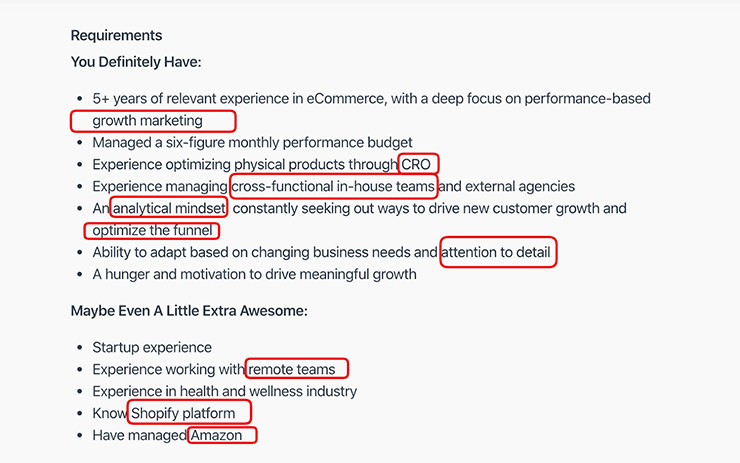Building a winning resume ain’t that easy. A huge part of this writing hassle is determining just what skills employers look for in your niche. After all, you know that you need to adapt your resume to every job you are applying to. But you are no mind-reader and cannot guess what this particular recruiter wants from the job applicant.
Or could you? : )
We may be no clairvoyants here at Freesumes. But we do know a thing or two about writing compelling resumes. Plus, we also love data. That’s why we prepared this big list of good skills to put on your resume (based on various industry research, not some crystal ball gazing!). Shall we dive in?
What Skills Do Employers Look For?
The short answer is that most employers look for a wholesome combination of soft and hard skills, relevant to the position. Approximately, 65%-75% of the total “score” will go towards your hard skills — the domain-specific abilities and knowledge you have. The remaining ~30% is allocated for your soft skills a.k.a. your people-skills or the abilities to effectively interact in all sorts of interpersonal relationships.
So if you want to beef up your resume skills section, that’s the equation you should be looking for.
Top 24 Skills to Put on your Resume
When it comes to hard skills, the original job posting serves as the best reference for what the employer needs.
We said that before, but it’s worth repeating it once again: mine that job description for keywords! Yes, just take and re-incorporate (word-by-word) some of the most prominent ones into your resume. In most cases, all those desired skills and qualifications will be listed in the Candidate Requirements section.
Here’s an example:

Ok, but you are probably looking for some shortcut method, eh?
Yes, customizing your resume per each job posting can be time-consuming. Plus, you also need to optimize your LinkedIn profile with relevant keywords. (Heck, we even wrote an entire guide about that, now part of our Ultimate Job Search bundle!).
So here are some universally good skills to put on a resume, as per Udemy’s latest report on workplace learning trends:
- Growth mindset
- Creativity
- Focus mastery
- Innovation
- Communication and interpersonal skills
- Storytelling
- Cultural awareness
- Critical thinking
- Leadership
- Emotional intelligence.
LinkedIn data for 2020 also shows a bit of an overall with Udemy findings and also indicates that most companies need people with the following professional skills:
- Persuasion
- Collaboration
- Adaptability
Plus, they also provide a list of top-10 hard skills for 2020. Spoiler: a lot of them are tech-related.
- Blockchain
- Cloud computing
- Analytical reasoning and other analytics skills
- Artificial Intelligence (AI)
- UX design
- Business analysis
- Affiliate marketing
- Sales
- Scientific computing
- Video production
OK, so that was a bit of an intro. Now let’s further drill into some more specific groups of soft and hard skills for your resume!
- Company Awareness
No matter what business sector you choose to work in, all recruiters will appreciate your company’s awareness. This basically means doing some homework about the company history, their major milestones, and any industry awards won or innovative steps taken in their field.
It can also help to have an understanding of the company’s direct competition in their marketplace, and a bit of background knowledge about the products and services on offer. Demonstrating commercial awareness will impress the recruiting officer, too.
In essence, you should line up several quick info-nuggets about the company and weave them into your cover letter. Doing so can help you warm up the recruiter towards you.
You can do several things to get those “ice-breakers” for your letter:
- Check the company’s social media accounts and read their feeds and regular updates.
- Browse their blog (if they have one) or sign up for the newsletter.
- Review media and press-release pages on the company website.
- Check their About Us or Mission page as these explain the vision and ethos behind the business.
Beyond your cover letter, you can also “boast” this knowledge during the interview to further demonstrate your strong interest and cultural alignment with the organization. Most employers value that a lot!
4 More Skills Groups to Put On Your Resume
Teamwork Skills
Just about every role you apply for will involve some level of teamwork, whether that is actually working within a large dedicated team, or with just one other person in a small business set-up. That’s why demonstrating that you have good teamwork skills within your resume is vital.

Just what teamwork skills should you put on your resume? Here’s a quick list:
- Conflict management
- Flexibility
- High emotional intelligence
- Maturity
- Cultural awareness
- Inclusivity
- Mediation
- Facilitation
- Negotiation
- Problem-solving
- Team building
- Mentorship
- Peer coaching
- Community building
- Team-oriented
- Positive attitude
- Sharing credit
- Tactful
- Supporting
- Project planning
- Project management
- Task management
- Time management
Note: There’s no need to use every one of these skills. Just sprinkle in the 2-3 most relevant ones.
The best way to highlight your teamwork skills on your resume is to speak about them in the context of your previous jobs, hobbies, sports, or study. If you are new to the workforce, this could include group projects at college, working alongside others in an office or retail setting, or being a player in your local sports team.
Your teamwork skills can be listed on your resume in a dedicated Skills section or you could list them within your ‘About Me’ section where you are trying to get over your personality. Ultimately, this would depend on the resume template you choose to use.
Good Communication and Interpersonal Skills
Giving your communication skills a prominent placement on your resume is another must-do.
Sharp interpersonal skills will be especially important to emphasize if you are applying for either of the following roles:
- Any customer-facing roles (such as customer service representative or jobs in hospitality).
- Jobs that involve talking to business clients and loads of B2B networking (e.g. sales or executive roles).
- Positions that involve a lot of internal collaborations with other departments within the company (e.g. marketing or administrative assistant jobs).
Previously, we published an entire post explaining what are interpersonal skills and which ones to list on your resume. So check it out for more pointers.
And here’s a quick tip on how to showcase these in your resume. The best way to show that you are a good communicator is by referring to a role (or duty) where you provided excellent customer service on a day to day basis or presented a project that involved contributions from other team members or information gathered from other departments.
It is important that you state your skills include not only verbal face-to-face communication but also personal presentation skills, telephone skills, as well as written and electronic combinations including social media.
Good Organizational Skills
Confirming that you have excellent time-management skills in this way will demonstrate that you are self-motivated and will make you more appealing to a prospective employer.

However, just saying that you have good organizational skills can sound a bit vague when written on a resume. So it’s better if you either be specific or refer to some examples from your day-to-day work. If you are applying for a role that involves a lot of spinning platters and tight deadlines, as well as high attention to details and superior planning skills, you can spruce up your resume with the following organizational skills:
- Collaboration
- Delegation
- Planning
- Physical organization
- Managing appointments/schedules
- Situational Assessment
- Task analysis
- Task assessment
- Workflow management
- Budgeting
- Forecasting
- Development planning
- Strategic planning
Plus, be sure to list all the project management tools and software you are familiar with — Asana, Notion, Trello, JIRA, etc. — as well as any specific PM techniques.
Strong organizational skills are much favored by recruiters looking to fill in positions in creative and fast-paced industries, such as media, publishing, marketing, etc. Plus, the tech industry!
Data Literacy
As much of our lives now happen in the digital realm, we are seeing increased growth in all sorts of business data. In fact, big data has gotten so huge that only select-few companies can effectively operationalize all of it.
But the main point is this: the investment in big data analytics is rising year-over-year and most businesses are switching towards analytics-based decision-making. For the regular workers change is coming too. Most are now tasked to interpret and analyze large volumes of incoming data, rather than rely on their “gut feeling” or expertise.
In a nutshell, that’s what data literacy is:
- Your ability to map the right data to the appropriate purpose
- Capability to understand (and create) data visualizations
- Employing critical thinking towards the information gained via data analysis.
So if you want to future-proof your career, you should definitely invest time and effort into your data literacy rate and overall analytical capabilities!
Last Tip: Don’t Forget About Transferable Skills
Obviously, every recruiter will be first assessing your soft and hard skills, relevant to the position. But, most will also pay attention to your transferable skills — the knowledge you can take from job to job.
So if you feel like you lack the desired qualifications for the role, place a greater emphasis on your adjunct skill set. For example, you want to change careers and apply for an IT job. As a former designer, you already have some basic coding knowledge (HTML/CSS), project management skills and a ton of eagerness to learn more. To draw the attention away from your small coding experience, speak more to your product design expertise and deep understanding of user experience — the two integral factors of great software products!
So now you have it, a big list of skills to put on your resume and add to your LinkedIn profile. And if you want to improve your resume a tad bit further, pack it into a more professional resume template with a prominent Skills section!
This post has been originally published on March 17, 2017 and has been extensively revised and updated on June 1, 2020.






